|
|
|
Sort Order |
|
|
|
Items / Page
|
|
|
|
|
|
|
| Srl | Item |
| 1 |
ID:
027124
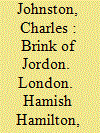

|
|
|
|
|
| Publication |
London, Hamish Hamilton, 1972.
|
| Description |
xvi, 179p.hbk
|
| Standard Number |
24102143X
|
|
|
|
|
|
|
|
|
|
|
|
Copies: C:1/I:0,R:0,Q:0
Circulation
| Accession# | Call# | Current Location | Status | Policy | Location |
| 011087 | 956.95/JOH 011087 | Main | On Shelf | General | |
|
|
|
|
| 2 |
ID:
104095
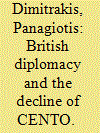

|
|
|
|
|
| Publication |
2009.
|
| Summary/Abstract |
The Central Treaty Organization (CENTO) is considered the failed West-inspired alliance of the Cold War that was dissolved in 1979 after the fall of the Shah. Britain found the regional member states, Iran, Turkey and Pakistan, unwilling to focus on a common deterrent strategy or assign forces to this alliance. For two decades Pakistan wanted to turn CENTO against India, but London resisted any policy that could offend New Delhi. Eventually Whitehall admitted that this organization was nothing more than "a paper tiger" and, in accordance with the 1974 Defence Review, opted for military disengagement from the alliance. British policy was based on a realist estimate: CENTO did not face the prospect of Russian aggression. Furthermore, no military contingency planning existed for the cooperation of CENTO with NATO.
|
|
|
|
|
|
|
|
|
|
|
|
|
|
|
|
| 3 |
ID:
000760
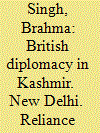

|
|
|
|
|
| Publication |
New Delhi, Reliance Publishing House, 1998.
|
| Description |
xii, 328p.Hbk
|
| Standard Number |
8175100702
|
|
|
|
|
|
|
|
|
|
|
|
Copies: C:1/I:0,R:0,Q:0
Circulation
| Accession# | Call# | Current Location | Status | Policy | Location |
| 041853 | 954.6/SIN 041853 | Main | On Shelf | General | |
|
|
|
|
| 4 |
ID:
155120
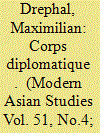

|
|
|
|
|
| Summary/Abstract |
This article studies diplomatic history in its physical dimensions. Its point of departure is the interpretation of the term ‘corps diplomatique’ in a literal sense. The article introduces the concept of the diplomatic body as a diplomat's body and as a body with diplomatic functions and meanings. Based on material relating to the British Legation in Kabul from 1922 until 1947, the body's ubiquity in international relations is revealed through the themes of space, language, and medicine. The article first looks at the impact of Kabul's spatial conditions and the physical reactions it excited in British diplomats. It then considers the bodies of Afghanistan's ruling elite as objects of British attention, whose appearance was documented in diplomatic records. Descriptions of these bodies in diplomatic language expressed intimacy and consensus as well as estrangement in British–Afghan relations. In addition to the metaphorical use of the diplomatic body, the provision of healthcare through the Legation's medical unit addressed the needs of British and Afghan bodies alike. It was also employed to further diplomatic ends by extending colonial medicine to the Afghan population. The study of the Legation's physical practices ultimately reveals the diplomatic mission's colonial origins and character.
|
|
|
|
|
|
|
|
|
|
|
|
|
|
|
|
| 5 |
ID:
170294
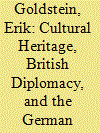

|
|
|
|
|
| Summary/Abstract |
Restitution of cultural objects was one of the topics covered in the Treaty of Versailles and the related peace treaties. Britain made specific claims in Article 246 relating to the Koran of Caliph Othman and the Skull of Sultan Mkwawa, whilst the Foreign Office considered other claims. Britain’s policy on cultural restitution influenced growing international norms, but it should also be seen in the context of Britain’s wider diplomatic concerns, stretching from the time of Castlereagh into the post-Second World War era.
|
|
|
|
|
|
|
|
|
|
|
|
|
|
|
|
| 6 |
ID:
038942
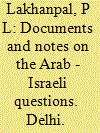

|
|
|
|
|
| Publication |
DelhI, Internation Books, 1968.
|
| Description |
viii, 400p.hbk
|
|
|
|
|
|
|
|
|
|
|
|
Copies: C:1/I:0,R:0,Q:0
Circulation
| Accession# | Call# | Current Location | Status | Policy | Location |
| 001837 | 956.94/LAK 001837 | Main | On Shelf | General | |
|
|
|
|
| 7 |
ID:
121868
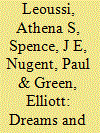

|
|
|
| 8 |
ID:
132414
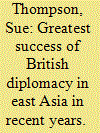

|
|
|
|
|
| Publication |
2014.
|
| Summary/Abstract |
Arthur de la Mare, an under-secretary of state at the British Foreign Office, wrote in 1967 that the ending of the Malaysia-Indonesia Confrontation of 1963-1966 was "the greatest success of British diplomacy in East Asia in recent years." However, historians generally believe British influence in the process to end this conflict was extremely limited, as it has been widely accepted that this conflict ended through bilateral negotiations between Jakarta and Kuala Lumpur. On one level, this view is accurate, but "Confrontation" took months to end and, during this process, British, American, and Malaysian officials hoped to encourage a change in leadership in Jakarta and an eventual end to the conflict. Confrontation was an anti-colonial and a regional dispute greatly affected by the Cold War environment in Southeast Asia and, therefore, not immune from international events or actors, especially the final phase of the conflict
|
|
|
|
|
|
|
|
|
|
|
|
|
|
|
|
| 9 |
ID:
080104
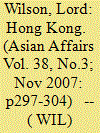

|
|
|
|
|
| Publication |
2007.
|
| Summary/Abstract |
Lord Wilson of Tillyorn was Governor of Hong Kong from 1987 to 1992, editor of the China Quarterly from 1968 to 1972 and a member of the British Diplomatic Service for many years. He is currently Master of Peterhouse, Cambridge and Chancellor of Aberdeen University
|
|
|
|
|
|
|
|
|
|
|
|
|
|
|
|
| 10 |
ID:
102028
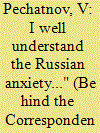

|
|
|
|
|
| Publication |
2010.
|
| Summary/Abstract |
THE WARTIME CORRESPONDENCE between Churchill and Stalin is a well-known and well-studied source on the history of Allied diplomacy. Little is known, however, how these famous messages were written. In my recent article in Russia in Global AffairsI looked at the Soviet angle 1 ; yet even the best Soviet/Russian and foreign specialists on the Soviet-British relations and Churchill have so far passed over in silence much of what was going on behind the scenes in Britain. The specifics of British diplomacy and the Cabinet system of governance, meanwhile, make the British side of the Stalin-Roosevelt-Churchill epistolary triangle especially important.
|
|
|
|
|
|
|
|
|
|
|
|
|
|
|
|
| 11 |
ID:
161006
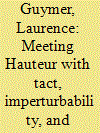

|
|
|
|
|
| Summary/Abstract |
This article takes a broad view of Anglo–Russian relations in the years between the Peace of Paris, 1856, and the death of Viscount Palmerston, 1865, examining the shifts within that period in an essentially high-political diplomatic history. It traces a number of strands in geopolitics, offering a sense of the competing strategies of the European Great Powers, particularly the roles of British diplomats: the private and public communication amongst prime ministers, foreign secretaries, ambassadors, ministers-plenipotentiaries and consular officials concerning British policy towards Russia in the post-Crimean War period. It outlines the principles that underlay that policy and the ways in which the diplomatic network observed the tsar and his advisors and agents, assessed the developing situation in Russia, Central Asia, and the Ottoman Balkans, made decisions, and implemented policy. It focusses on the diplomatists’ attitudes and perceptions—how they thought about Russia and British interests and how they worked to protect them. It also analyses British policy in light of the European dimension. The years 1856 to 1865 not only witnessed Russian attempts to undermine the Crimean settlement, they also saw revisionist Bonapartist France work to destroy the constraining Vienna system of 1815—primarily in northern Italy. These policies complicated British attempts to maintain the status-quo and defend their interests in the East. The evolving situation was highly complex.
|
|
|
|
|
|
|
|
|
|
|
|
|
|
|
|
|
|
|
|
|